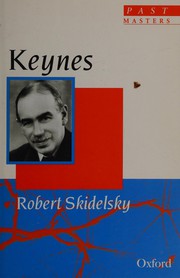Check nearby libraries
Buy this book

John Maynard Keynes (1883-1946) is a central thinker of the twentieth century, not just an economic theorist and statesman, but in the borderland of economics, philosophy, politics, and culture.
Keynes's doctrines continue to inspire strong feelings in admirers and detractors alike. This short, engaging study of his life and thought explores the many positive and negative stereotypes and also examines the quality of Keynes's mind, his cultural and social milieu, his ethical and practical philosophy, and his monetary thought.
Recent scholarship has significantly altered the treatment and assessment of Keynes's contribution to twentieth-century economic thinking, and the current state of the debate initiated by the Keynesian revolution is discussed in a final chapter on its legacy.
Check nearby libraries
Buy this book

Previews available in: English
Showing 5 featured editions. View all 20 editions?
| Edition | Availability |
|---|---|
|
1
Keynes: the return of the master
2010, PublicAffairs
electronic resource :
in English
- 1st ed.
158648897X 9781586488970
|
zzzz
|
| 2 |
zzzz
|
| 3 |
eeee
|
| 4 |
aaaa
|
|
5
John Maynard Keynes: 1883-1920, Hopes Betrayed (Keynesian Studies)
May 1984, Gage Distribution Co
Hardcover
in English
0333115996 9780333115992
|
cccc
|
Book Details
Edition Notes
Includes bibliographical references (p. 132-133) and index.
Classifications
The Physical Object
ID Numbers
Source records
Scriblio MARC recordLibrary of Congress MARC record
Library of Congress MARC record
Internet Archive item record
Promise Item
Better World Books record
marc_columbia MARC record
Work Description
The ideas of John Maynard Keynes have never been more timely. No one has bettered Keynes's description of the psychology of investors during a financial crisis: ‘The practice of calmness and immobility, of certainty and security, suddenly breaks down. New fears and hopes will, without warning, take charge of human conduct… the market will be subject to waves of optimistic and pessimistic sentiment.' Keynes's preeminent biographer, Robert Skidelsky, Emeritus Professor of Political Economy at the University of Warwick, brilliantly synthesizes from Keynes's career and life the aspects of his thinking that apply most directly to the world we currently live in. In so doing, Skidelsky shows that Keynes's mixture of pragmatism and realism – which distinguished his thinking from the neo-classical or Chicago school of economics that has been the dominant influence since the Thatcher-Reagan era and which made possible the raw market capitalism that created the current global financial crisis – is more pertinent and applicable than ever. Crucially Keynes offers nervous capitalists – and Keynes never wavered in his belief in the capitalist system – a positive answer to the question we now face: When unbridled capitalism falters, is there an alternative? "In the long run," as Keynes famously said, "we are all dead". We may not have time to wait for the perfect theoretical operation of capital as the neo-classicists insist will happen eventually. In the meantime, we have Keynes: more supple, more human and more magnificently real than ever.
Links outside Open Library
Community Reviews (0)
Feedback?History
- Created April 1, 2008
- 10 revisions
Wikipedia citation
×CloseCopy and paste this code into your Wikipedia page. Need help?
| August 4, 2024 | Edited by MARC Bot | import existing book |
| January 17, 2023 | Edited by ImportBot | import existing book |
| December 9, 2022 | Edited by ImportBot | import existing book |
| January 23, 2021 | Edited by ImportBot | import existing book |
| April 1, 2008 | Created by an anonymous user | Imported from Scriblio MARC record |















